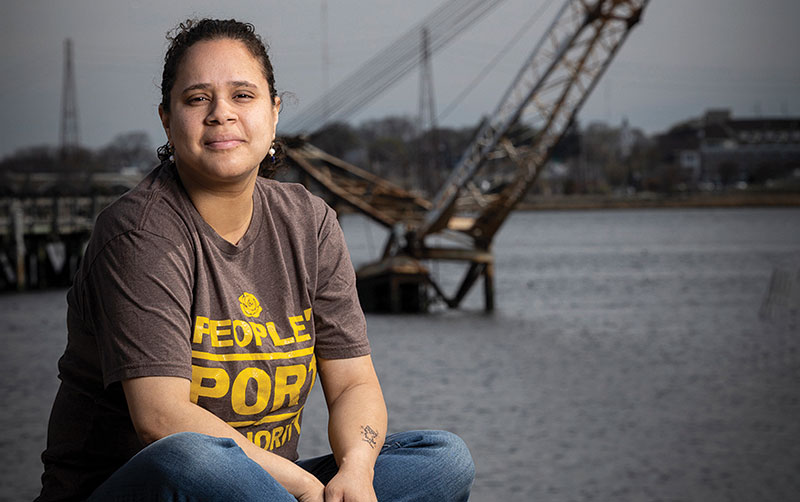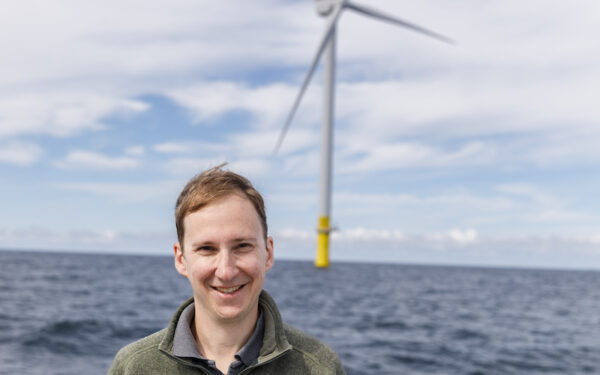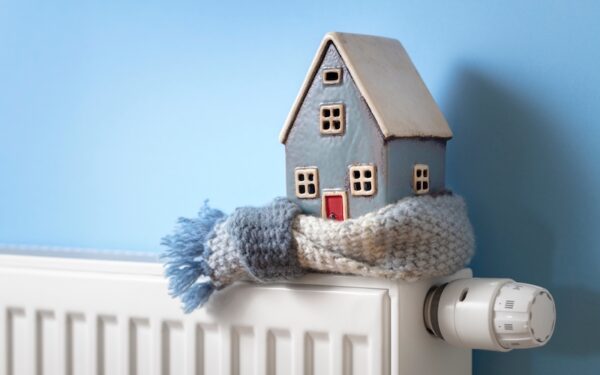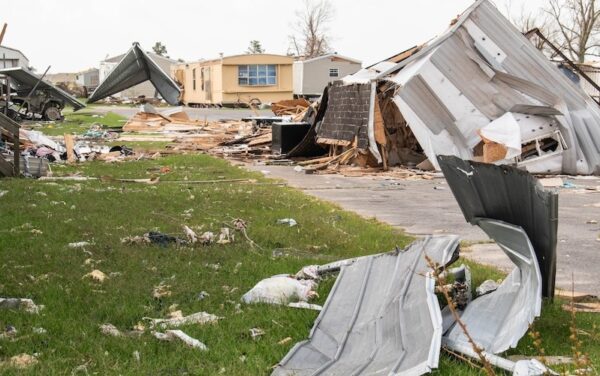
Monica Huertas is leading the fight for environmental justice in her Providence, Rhode Island, neighborhood. Photo: Tom Kates
Across Rhode Island and New England, people of color and low-income communities often shoulder an unfair share of pollution and other environmental threats. They also are denied the environmental benefits – things like lush tree canopy, parks and other green space, or walkable neighborhoods – taken for granted in whiter, wealthier communities.
Rhode Islanders deserve better. Monica Huertas is among those leading the fight for environmental justice in her community. The mother of four’s passion lies in her work as a doula, but she recognizes that for her own kids – and the babies she delivers – to grow up healthy, she and her neighbors must take a stand against the industrial pollution fouling her community.
That’s why Huertas serves as executive director of the People’s Port Authority, a group of Providence residents demanding community oversight over the heavily industrialized Port of Providence. She also co-chairs the Renew Rhode Island coalition, which works to build a people’s movement for environmental, racial, and economic justice. And she leads the Racial and Environmental Justice Committee of Providence.
I sat with Huertas to learn about her work and commitment to environmental justice.
*This interview has been edited for clarity.
How would you describe your Providence community?
I live in Washington Park, just a few blocks from the Port of Providence. It’s a very diverse community in income and origin. You’ll see a three-tenement house next to a single-family home. I’m from Puerto Rico. Across the street, in tenement housing, lives a Cambodian family. Next door, there’s a Portuguese family. Legit, I just love that!
Tell me about the People’s Port Authority. What’s at the heart of the work that you’re doing?
The People’s Port Authority officially started in 2020, but we had been working since 2017. We wanted to stop the construction of a liquefied natural gas facility here in the Port of Providence. But we quickly realized that the problem was bigger than gas.
We have so many bottom-of-the-barrel things in the port. Look around. We got salt piles right here, a factory over there, and then a scrap metal facility on the other side of the street. And this is just one block. Why the heck have we got to have that in our backyard? Some are so toxic that next door – in Massachusetts and Connecticut – they’re banned or illegal to store. And it’s many of these things piled on top of each other.
Other port areas across the U.S. have a port authority that regulates companies to keep them in check. We don’t have that here. But this is our community, and this is our port. So, we are the “people’s port authority.” We’re making sure we are at the meetings where the decisions are made. And we’re making sure that all the companies, corporations, and big conglomerates can’t do anything here without oversight and input from the community.
How did you get involved in activism, particularly in environmental justice work?
After years of being homeless and struggling, things changed for me. I got my degree, had three children, my husband got a good-paying job, and we bought our first home. I felt happy. Then I told my friend, “I’m going to plant tomatoes and have chickens.” And she said, “You can’t have that, the soil is contaminated. There’s pollution and lead from the house.”
They were right, and I found out the hard way.
I was pregnant with my fourth child when we moved to that house, and a few months after he was born, we discovered he had lead poisoning. It felt like an injustice because I had done everything we’re all told to do. I had cleaned every corner, repainted the walls, and tested the home for lead. But I did not test the soil. Why would I? Why can’t I even let my kid play in my backyard?
I was already involved in opposing the proposed liquefied natural gas tank. But all these things together pissed me off and made me the environmental activist I am now.
How do you explain environmental racism to people?
Environmental racism is as American as apple pie. It’s basically where a group of unwanted chemicals goes into the neighborhood where the unwanted people live. They certainly do not put any of these chemicals and any of these facilities in wealthy and white neighborhoods where people speak English. It means living on the other side of the tracks, the “wrong side.” And the tracks that were put there deliberately to create that divide.
You’ll see scrap, tar, oil, gas, poorly funded schools, and women dying from giving birth. That’s environmental racism. And those of us who live on the “wrong side” know environmental racism well. We know it because it has existed for generations.
But we love our neighborhoods and our community. And we care about them, too – mostly because we have no other choice. Because wherever we go, wherever our type of people are, that’s where these types of chemicals follow.
But don’t be fooled – it hasn’t always been like that. It was made to be this way. But it also means we can change it back. And we are at a turning point where we’re going to make it better for us again.
What do you say to residents who might feel hopeless going up against these powerful corporations?
It’s hard and scary, but it’s the right thing to do. And knowing that you and your community are right gives you courage.
We know our children get poisoned with lead. We see our neighbors rushing their kids to the emergency room for asthma complications from air pollution. And even during nice, beautiful days like today, we open our windows and know what we smell – gas or tar or cement or oil.
We also know what the problems are and who is responsible. And we know we deserve so much better. That’s why our community shows up and speaks out. More than anything, we’re happy and proud to do anything we can.
And for you personally, how do you stay motivated in the face of these challenges?
I’m a mother and I have four children, and I do this work because of them, literally. I want them to live in a good and healthy place, the place that they were born in. I’ve been coming back and forth between Puerto Rico and Rhode Island my whole life. But they were all born here. And I want them to be proud of the place where they were born.
Rhode Island Needs an Environmental Justice Bill
The issues that Huertas and her community fight against are far from rare. Every community should have the power to impact the decisions that affect their health, livelihoods, and quality of life. That’s why groups like Huertas’ are pushing state legislators to pass an environmental justice bill. This law would ensure that overburdened communities like Providence’s Washington Park neighborhood have a more active voice in processes for state and city permits when industrial facilities want to build in their backyard.
You can help. Make sure you’re signed up for CLF email alerts, and stay tuned for opportunities to urge your legislators to pass a strong environmental justice bill for Rhode Island.



